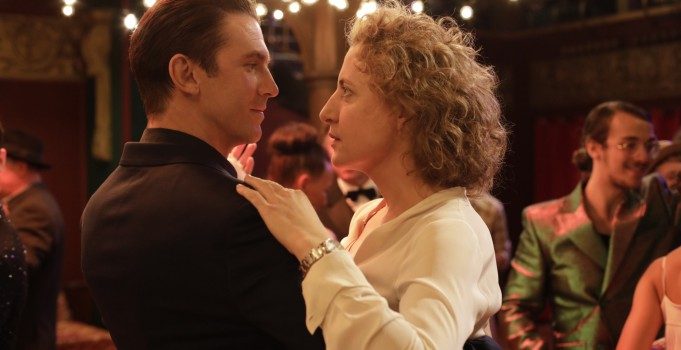By Lynn Venhaus
“She Said” is a brilliant chronicle of a watershed moment in American society — an important tipping point that helped launch the #MeToo movement and gave voice to countless victims.
In October 2017, two New York Times reporters Megan Twohey (Carey Mulligan) and Jodi Kantor (Jodi Kantor) broke the shocking story about sexual assault in Hollywood, able to get women on the record about powerful producer Harvey Weinstein’s three decades of abuse, shattering years of silence and altered American culture forever.
Framed as a scrupulous workplace account of two driven working mothers juggling their journalism careers and their young families, filmmakers infer that they helped make the world a better place for their daughters.
The absorbing narrative is as accurate as possible about journalism and the need to tell such important stories. Through vivid revelations, they show how much courage it took for people to come forward, risking their reputations and livelihoods.
With laser focus, director Maria Schrader has meticulously built a riveting drama from a sharp, incisive script by Rebecca Lenkiewicz, who adapted the 2019 nonfiction bestseller “She Said: Breaking the Sexual Harassment Story That Helped Ignite a Movement” by New York Times reporters Megan Twohey and Jodi Kantor.
The filmmakers’ skill and concern detailing a reporter’s process and a newspaper’s commitment to seeking the truth without any sensationalism or exploitation has resulted in a historic record that is in the same league as “All the President’s Men” and “Spotlight.”

The cast is stellar across the board, with Zoe Kazan, as persistent Jodi Kantor, and Carey Mulligan, as resilient Megan Twohey, presenting each reporter’s dogged determination, integrity, and professionalism.
As an energetic team, they pound the pavement tracking down sources who worked for Miramax and The Weinstein Company, arrange meetings and convince people to trust them with the evidence. Women who were actresses, production assistants and employees agreed to go on record, and these truth tellers caused an explosion felt from coast to coast once articles were published in 2017.
Kantor and Twohey, who are still at the Times, won Pulitzer Prizes for their work here, along with Ronan Farrow, whose work at the New Yorker was going on at the same time.
But while the aftermath is brought up as the film’s coda, this 129-minute film stresses the diligent meat-and-potatoes work that exposed the insidiousness of rampant sexual harassment in Hollywood, and how broken the system was for women.
Schrader makes sure we hear powerful men shouting at the women, trying to intimidate them, but she also uses real voice transcriptions.
While it may not be as explosive cinematically as superhero adventures, the theme of right vs. might hits hard from people not wearing capes but whose guideposts are truth and justice. Patricia Clarkson plays conscientious Times editor Rebecca Corbett and Andrew Braugher portrays no-nonsense executive editor Dean Baquet as they make crucial decisions in covering the substantial allegations.
Fine actresses portray the brave past Weinstein employees who described his predatory sexual misconduct including Jennifer Ehle as Laura Madden, Samantha Morton as Zelda Perkins, Angela Yeoh as Rowena Chiu. Ashley Judd, who broke the dam by publicly coming forward, plays herself.
Important voice work is done by Mike Houston as Weinstein, Keilly McQuail as Rose McGowan and James Austin Johnson as Donald Trump. Johnson is best known for his interpretations on “Saturday Night Live.”
As the supportive spouses, Tom Pelphrey plays Megan’s literary-agent husband Vadim “Jim” Rutman and Adam Shapiro is Kantor’s fellow Times writer, columnist Jim Lieber. They add the emotional element of how difficult life-work balance is.
Composer Nicholas Britell’s dramatic score heightens the tension as people connected to the Weinstein empire confirm information and a deadline looms.
How many women have been helped or validated because of this story? Truly astounding what happened five years ago, and what continues. After their initial probe, more than 80 women accused Weinstein of crimes. Now a convicted rapist, the disgraced mogul eventually was sentenced to 23 years in prison and is currently on trial in another case.
“She Said” is so well-made and convincingly acted that it can’t help but continue much needed conversations at work and home. It’s an information-packed procedural with lasting impact.

“She Said” is a 2022 biographical drama directed by Maria Schrader and starring Zoe Kazan, Carey Mulligan, Andre Braugher and Patricia Clarkson. Rated R for language and descriptions of sexual assault, its run time is 2 hours, 9 minutes. It is in theaters Nov. 18.
Lynn’s Grade: A

Lynn (Zipfel) Venhaus has had a continuous byline in St. Louis metro region publications since 1978. She writes features and news for Belleville News-Democrat and contributes to St. Louis magazine and other publications.
She is a Rotten Tomatoes-approved film critic, currently reviews films for Webster-Kirkwood Times and KTRS Radio, covers entertainment for PopLifeSTL.com and co-hosts podcast PopLifeSTL.com…Presents.
She is a member of Critics Choice Association, where she serves on the women’s and marketing committees; Alliance of Women Film Journalists; and on the board of the St. Louis Film Critics Association. She is a founding and board member of the St. Louis Theater Circle.
She is retired from teaching journalism/media as an adjunct college instructor.





